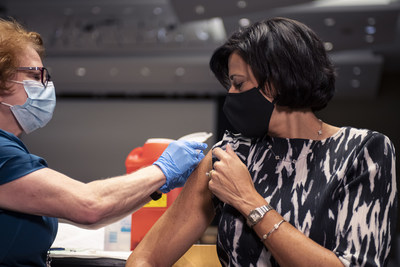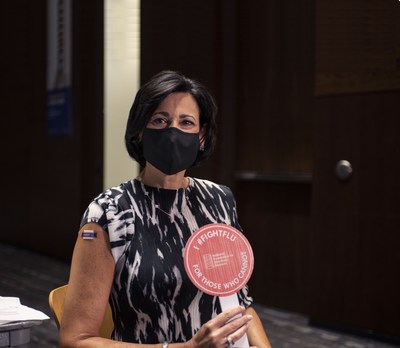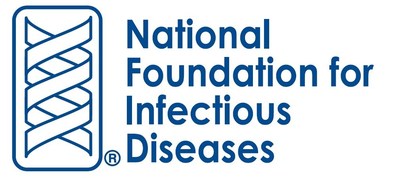Subjects: SVY, BFA, PSF
US Health Officials Urge Vaccination Amid Concerns About Influenza Resurgence During Ongoing Pandemic
BETHESDA, Md., Oct. 7, 2021 /PRNewswire/ -- New data released today by the National Foundation for Infectious Diseases (NFID) showed that 44 percent of US adults are unsure or do not plan to get vaccinated against influenza (flu) during the 2021-2022 flu season. Of further concern, the survey found that nearly 1 in 4 (23 percent) who are at higher risk for flu-related complications said they were not planning to get vaccinated this season. At a news conference today, representatives from NFID and other leading public health and medical organizations, including Centers for Disease Control and Prevention (CDC) Director Rochelle P. Walensky, MD, MPH, urged everyone age 6 months and older to get vaccinated against flu annually.
"While we do not know what flu activity will be like this fall?I urge everyone age 6 months and older to get vaccinated. If you are unsure about getting a flu vaccine, please take the time to get the information you need to make the right choice for your health and to get vaccinated. The COVID-19 pandemic is not over, and the risk of both flu and COVID-19 circulating could put additional strain on hospitals and frontline healthcare professionals," said Dr. Walensky. "Getting vaccinated against flu is the best way that everyone can protect themselves and their loved ones against flu and help reduce additional demands on our healthcare system."
"While flu activity was historically low during the 2020-2021 flu season, we could see flu activity surge this season, with relaxed COVID-19 mitigation strategies, increased travel, and the reopening of schools and businesses," said NFID Medical Director William Schaffner, MD. "The best way to protect yourself against flu is to get an annual flu vaccine. Even in cases when flu vaccination does not completely prevent infection, it can reduce the duration and severity of illness and can help prevent serious complications, including hospitalization and death."
The NFID annual survey on attitudes and behaviors around flu, pneumococcal disease, and COVID-19 also revealed that among adults age 65 years and older, or those with an underlying health condition who are at higher risk for pneumococcal disease, 51 percent are not familiar with pneumococcal disease and only about a third (32 percent) report that they have been advised to get vaccinated against pneumococcal disease. "Flu season is a great time to make sure you are up to date on pneumococcal vaccination, as pneumococcal disease can be a serious complication of flu," said Dr. Schaffner.
The NFID survey found that 37 percent of adults are very or extremely worried about COVID-19 (for themselves or someone in their family), but only 19 percent are similarly concerned about flu. Hispanic adults (52 percent) and Black adults (45 percent) are more likely to be worried about contracting both flu and COVID-19 at the same time compared with White adults (27 percent).
Dr. Walensky and Dr. Schaffner were joined at today's news conference by Laura E. Riley, MD, obstetrician and gynecologist-in-chief, NewYork-Presbyterian/Weill Cornell Medical Center and chair, Department of Obstetrics and Gynecology, Weill Cornell Medicine; Cedric "Jamie" Rutland, MD, CEO of West Coast Lung and COVID-19 medical director, Private Health Management; and NFID President-Elect Patricia (Patsy) A. Stinchfield, RN, MS, CPNP, pediatric nurse practitioner, Children's Minnesota (retired) and affiliate faculty, School of Nursing, University of Minnesota.
Flu vaccination is important for everyone, the experts said, but it is especially important for populations at higher risk for complications from flu, including pregnant women, children under 5 years of age, adults age 65 and older, and those with certain chronic medical conditions, including diabetes, lung disease, and heart disease. Unfortunately, many of these populations have sub-optimal vaccination rates.
During the 2020-2021 flu season, CDC estimates 52 percent of the overall US population age 6 months and older got a flu vaccine, which was similar to coverage during the 2019-2020 season. Flu vaccination among adults rose to 50 percent, with coverage higher among older adults compared to younger adults. "We are encouraged to see that overall vaccination coverage held steady even in the midst of the country's worst public health crisis in more than a century," said Dr. Walensky, "but there are some troubling findings."
Among children age 6 months to 17 years, flu vaccination coverage was nearly 59 percent for the 2020-2021 flu season, a decrease from the previous season (64 percent). In prior flu seasons, about 80 percent of children who died from flu were not fully vaccinated. "Children age 5 years and younger are at higher risk of serious flu-related illness and we need to ensure our children are protected before flu starts spreading in schools and communities. Flu vaccines can be life saving for children," said Patricia Stinchfield.
For pregnant women, vaccination coverage at 55 percent was similar to the prior season. "Nearly half of pregnant women and their infants remain unprotected against flu," said Dr. Riley. "All pregnant women should get a flu vaccine to protect themselves and their newborn babies from severe complications."
Flu vaccine coverage during the 2020-2021 flu season was only 42 percent among US adults age 18 to 49 years with at least one chronic health condition. "Amid the ongoing pandemic, we remain extremely concerned about patients with chronic health conditions who are at higher risk for pneumococcal disease and complications from flu and COVID-19," said Dr. Rutland, an expert in pulmonary and critical care. "Vaccination is essential to help protect them."
Experts are also concerned about disparities in vaccination rates among both children and adults in certain racial and ethnic populations. "Communities of color are disproportionately impacted by both flu and COVID-19, yet many remain unvaccinated," said Dr. Rutland. During the 2020-2021 flu season, among all individuals age 6 months and older, White individuals had higher flu vaccination coverage at 56 percent, compared with Black individuals (43 percent), Hispanic individuals (45 percent), and other racial and ethnic groups (52 percent).
On a more positive note, the pandemic appears to be driving changes in other health-related behaviors. The NFID survey found that 54 percent of US adults plan to wear a mask in certain situations during flu season and 45 percent say the pandemic will make them more likely to stay home from work or school if they are sick. "That's good news," says Dr. Schaffner, "but it does not change the fact that the single most important thing you can do to help protect yourself and others is to get vaccinated."
All vaccination coverage estimates from the 2020-2021 flu season were published online today and are available on the CDC FluVaxView website. The composition of 2021-2022 US flu vaccines is available at: www.nfid.org/influenza-vaccine-options-2021-2022-season/. COVID-19 vaccines can be coadministered with other vaccines, including flu vaccines, in both adults and in children age 12 years and older.
About the National Foundation for Infectious Diseases
Founded in 1973, the National Foundation for Infectious Diseases (NFID) is a non-profit 501(c)(3) organization dedicated to educating the public and healthcare professionals about the burden, causes, prevention, diagnosis, and treatment of infectious diseases across the lifespan. For additional information, visit www.nfid.org.
Attitudes about Flu, COVID-19 and Pneumococcal Disease Prevention National Survey
This NFID-sponsored survey was conducted by NORC at the University of Chicago. Data were collected using the AmeriSpeak Omnibus®, a monthly multi-client survey using the NORC probability-based panel designed to be representative of the US household population. Interviews for this survey were conducted between August 12 and 16, 2021, with adults age 18 years and older representing the 50 states and the District of Columbia. Panel members were randomly drawn from AmeriSpeak, and 1,000 completed the survey?897 via the web and 103 via telephone. Interviews were conducted in English. More information about the survey methodology and findings is available at: www.nfid.org/2021flusurvey.
This news conference is sponsored by NFID in collaboration with the Centers for Disease Control and Prevention, and support from professional societies and patient advocacy partners. Funding was provided by AstraZeneca, Genentech, Merck & Co., Inc., Sanofi Pasteur, and Seqirus. NFID policies prohibit funders from controlling program content.
Contact:
Ned Berkowitz
914-740-8255
[email protected]
SOURCE National Foundation for Infectious Diseases
These press releases may also interest you
|
News published on and distributed by:






